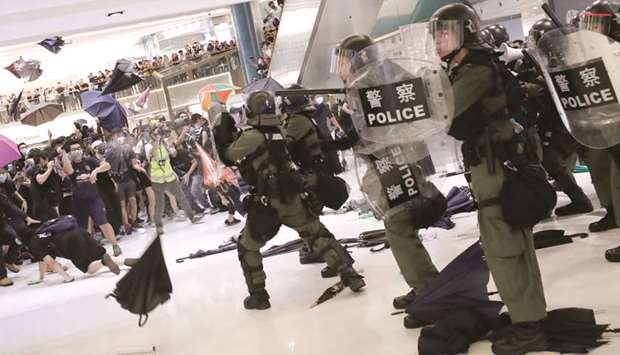Tens of thousands rallied in a large Hong Kong suburb yesterday, driven by abiding anger at the government’s handling of an extradition bill that has revived fears of China tightening its grip over the former British colony and eroding its freedoms.
Millions have taken to the streets over the past month in some of the largest and most violent protests in decades over an extradition bill that would allow people to be sent to mainland China for trial in courts controlled by the Communist Party.
Clashes broke out as protesters hurled umbrellas and plastic bottles at police who retaliated by firing pepper spray amid chaotic scenes inside a shopping mall that houses some of the world’s biggest luxury brands.
Most of the demonstrators dispersed shortly afterward as a small group sang the Christian hymn “Sing Hallelujah to the Lord”, which has emerged as the unlikely anthem of the protests.
Protesters marched in sweltering heat of about 32 degrees Celsius (89.6°F) in Sha Tin, a town between Hong Kong island and the border with China, extending the demonstrations outward from the heart of the financial centre into
surrounding districts.
“These days there is really no trust of China, and so the protesters come out,” said
Jennie Kwan, 73.
“Didn’t they promise 50 years, no change? And yet we’ve all seen the changes. I myself am already 70-something years old. What do I know about politics? But politics comes to you.”
Hong Kong returned to Chinese rule in 1997 under a “one country, two systems” formula that guarantees its people freedoms for 50 years that are not enjoyed in mainland China, including the liberty to protest and an independent judiciary.
Beijing denies interfering in Hong Kong affairs, but many residents worry about what they see as an erosion of those freedoms and a relentless march toward mainland control.
Hong Kong’s embattled leader, Carrie Lam, has said the extradition bill is “dead”, but opponents say they will settle for nothing short of its formal withdrawal.
Some protesters yesterday waved banners appealing to US President Donald Trump to “Please liberate Hong Kong” and “Defend our Constitution”. Such scenes are certain to rile Beijing, which has been angered by criticism from Washington and London over the
controversial bill.
Others waved British and American flags, while banners calling for Hong Kong’s independence billowed in the sultry breeze from makeshift
flagpoles.
One placard featured a picture of Chinese leader Xi Jinping with the words: “Extradite to China, disappear forever.”
Chants of “Carrie Lam go to hell!” rang through the crowd, gathered well away from the island heart of the financial centre which has witnessed the largest and most violent demonstrations
over the past month.
Organisers said around 115,000 attended yesterday’s rally. Police put the number at 28,000 at its peak.
The bill has stirred outrage across broad sections of Hong Kong society amid concerns it would threaten the much-cherished rule of law that underpins the city’s international financial status. Young, elderly and families joined the latest protest.
The protests have caused the former British colony’s biggest political crisis since its handover to China. Demonstrators stormed the Legislative Council building on July 1 and ransacked it.
“I never missed a march so far since June,” said a 69-year-old man who gave only his
surname, Chen.
“I support the youngsters, they have done something we haven’t done. There is nothing we can do to help them, but come out and march to show our appreciation and support.”
Protesters are also demanding that Lam step down, the withdrawal of the word “riot” to describe demonstrations, the unconditional release of those arrested and an independent investigation into complaints of police brutality.
Police have condemned what they describe as “violent protesters” and stressed that officers will investigate all illegal acts.
One woman, in her mid-50s, said protesters had harassed her after she tried to defend the police, whom activists
described as “dogs”.
“It’s verbal violence,” said the woman, who gave her name only as Catherine. “People just surrounded me and shouted rude language and that makes me feel I am living in fear.”
Mass protests over the bill since June have morphed into demonstrations over democracy and broader grievances in society.

Riot police use pepper spray to disperse pro-democracy activists inside a mall after a march at Sha Tin District of East New Territories in Hong Kong yesterday.
